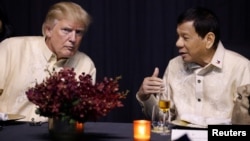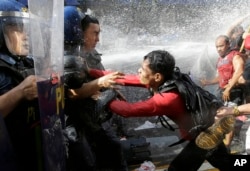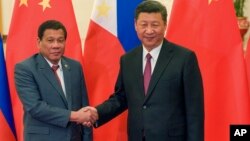Just 14 months ago, Philippine President Rodrigo Duterte called former U.S. President Barack Obama a “son of a whore,” prompting Obama to avoid meeting his Philippine counterpart at an Association of Southeast Asian Nations meeting in Laos.
But times have changed.
Now that association, better known as ASEAN, is meeting in Manila and Duterte is in charge. He has met current U.S. President Donald Trump twice ceremonially here and is holding an extended meeting with him Monday.
Duterte’s chairing role in the association, along with regular state visits around Asia in his 16 months in office, have helped to refine his character, earning him new respect, analysts say.
“He has to play along with the script,” said Eduardo Araral, associate professor at the National University of Singapore’s public policy school. “Otherwise it would be a very long day if he does his usual impromptu.”
Trump and Duterte have so far this week shelved any differences, including possible U.S. objections to extrajudicial killings in his anti-drug campaign. Duterte also offered a polite “no thanks” to Trump’s offer for mediation in the South China Sea sovereignty dispute involving five other governments, including the Philippines.
Duterte made friends last year with China, the sea’s most powerful claimant, and Beijing prefers two-way dialogue.
Profanity to diplomacy
Last year, in addition to insulting Obama, Duterte called the U.N. human rights chief an “idiot” over comments about killings in the Philippine anti-drug campaign.
In the same year, he threatened to kick out U.S. military personnel from the Philippines despite continued reliance on U.S. help in national defense since American colonialism ended in 1946.
The 72-year-old former mayor of the archipelago’s second largest city also has told Filipinos he personally killed people.
But this year he has not only spurned profanity and threats in the face of foreign officials. Some credit him with getting Trump to extend his stay at this week’s summits by a day and avoiding any boycotts.
Police have stopped anti-Trump protest groups from disrupting the summit venues.
Filipinos who follow ASEAN, often those working near the summit venues in Metro Manila’s booming bayside Pasay City, expect Duterte to use his improved image to form foreign relations strong enough to increase trade and investment.
Just last month, Japan pledged $5.8 billion in economic support as the Philippines pursues $167 billion in infrastructure renewal. China is offering $24 billion in investment and aid.
But experts caution that new trade and investment are more likely to respond to Philippine economic growth of 6.9 percent last year, low labor costs and cost savings from new infrastructure, such as railways and ports. Net foreign investment inflows rose 40.7 percent last year.
Public support
Rasheda Torio, an outdoor vendor of candies in Metro Manila, said she’s “proud of the Philippines” but expects no tangible benefits from the summits this week.
“I’m just a small saleslady here, so I don’t know if I can get that benefit,” said Torio, 24.
“After this meeting we will have strong economic relations, especially with ASEAN’s countries,” said Ron Mendoza, 23, a retail worker at the giant SM Mall of Asia in Pasay City. He expects a faster flow of goods between the Philippines and other Asian countries.
“I think even if we were having a little conflict with China before, we will be having a much stronger relationship right now,” he said.
About two-thirds of Filipinos endorse Duterte, according to polls by the Metro Manila research institution Social Weather Stations.
Approval ratings have trended high over his term in office to date despite inflammatory talk and suspected use of extrajudicial killings, because many feel crime rates are falling. His image-building among foreign heads of state adds to public enthusiasm.
ASEAN leadership allows Asia to get to know Duterte better, said Anita Aduana, 52, who works at a vision clinic in Metro Manila. She expects more investment in the Philippines to follow.
“We support him, I think, not only 100 percent but 200 percent,” Aduana said. “That’s the bigger part of it for ASEAN.”
Sidestepping Southeast Asia’s big controversy
Duterte, though he still speaks his mind on issues such as Islamic State-backed terrorism and the social impact of illegal drugs, two topics that came up at the summits Monday, he has downplayed the South China Sea dispute involving the Philippines and four other ASEAN countries.
China, as the most powerful claimant, resents international condemnation of its island building or military infrastructure in the sea. It prefers bilateral talks on any disputes. Cooperative countries such as the Philippines, Malaysia and Vietnam have received economic benefits in response.
The association is already working on a code of conduct to prevent mishaps on the sea that runs from China south to the island of Borneo.
“The Philippines has actually managed the ASEAN chairmanship in a fairly normal matter this far,” said Carl Baker, director of programs with the think tank Pacific Forum CSIS in Honolulu.
“The one area where Duterte’s leadership may have the biggest impact is the lack of emphasis that I expect to see on the South China Sea territorial disputes,” Baker said.
“I suspect what we will see on the topic is the narrative that China and ASEAN are working on fleshing out the Code of Conduct framework and the recognition that the territorial disputes must be resolved bilaterally,” he said.







